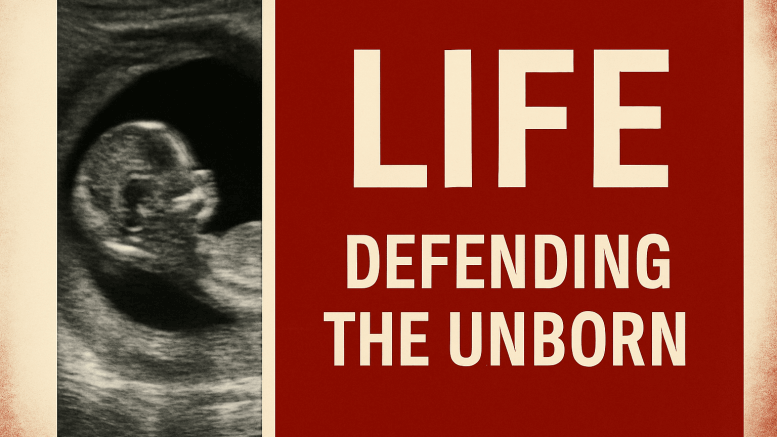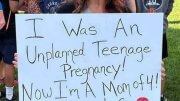For over 15 years, the Virginia Christian Alliance has defended the Sanctity of Life and exposed threats the culture ignores. This repost from The Washington Stand shows why “states’ rights” cannot stop abortion on demand—especially as abortion pills cross borders and undermine pro-life laws. Jeff Bayard, VCA has also reported, these same pills are not only killing the unborn but contaminating America’s water systems, a hidden public health crisis our agencies refuse to study . We urge readers to follow The Washington Stand’s reporting as this national life-and-death battle escalates.
Chuck Donovan and Bob Marshall | Washington Stand
The Supreme Court’s 2022 Dobbs v. Jackson decision is popularly understood to have reversed the infamous 1973 ruling in Roe v. Wade, leaving states free once again to decide the legality of abortion. In early 2024, nearly two years after Dobbs, as he launched his third campaign for the presidency, Donald Trump noted, “My view is now that we have abortion where everybody wanted it from a legal standpoint, the states will determine by vote or legislation or perhaps both, and whatever they decide must be the law of the land — in this case, the law of the state.”
By implication (ratified afterward in a diluted national Republican platform adopted by a closed process in July 2024), the aftermath of Dobbs would be a patchwork of laws in the states regarding abortion, with no significant federal role. The history of state legal action on the issue both pre-Roe in 1973 and afterward showed that freely enacted state laws would range from radically permissive, as in New York and California, to protective (to the extent permitted by the Court’s rulings) as in, for example, Utah and Louisiana.
One abortion proponent, Planned Parenthood Action of New Hampshire, predicted immediately after the Dobbs decision in 2022, “Up to 26 states in the country are certain or likely to ban abortion[.]” A current analysis by Susan B. Anthony Pro-Life America shows that 21 states have so far stepped up to protect unborn human life, while 29 states and the District of Columbia have few or no protections in place.
The question arises: in the fall of 2025, are the states truly free to protect children from death by abortion even within their own borders where they have clear authority to prohibit abortions? Let’s examine several features of the current legal landscape.
Shield Laws
The first phenomenon to note is that abortion practice has largely shifted to chemical/medical procedures — with such drugs being shipped by mail or private common carrier to women or girls seeking abortion who live in states that have outlawed abortion.
For example, the Associated Press reported in June that, “Every month, thousands of women thwart abortion bans in their home states by turning to telehealth clinics willing to prescribe pregnancy-ending drugs online and ship them anywhere in the country…” By the mechanism of shield laws, which install an array of protections for abortion pill prescribers from criminal, civil, or professional penalties for violating the abortion laws of pro-life states, nearly two dozen states are actively enabling the continuation of abortion in states that had enacted statutes permissible under Dobbs.
These statutes and, in some cases, executive orders have prompted pro-life states to seek legal recourse to protect their residents from abortion by mail. Texas Attorney General Ken Paxton (R) filed a civil suit in New York last December against a New York doctor who unlawfully provided a Texas resident “with abortion-inducing drugs that ended the life of an unborn child and resulted in serious complications for the mother, who then required medical intervention. … Additionally,” the suit stated, “no physician may treat patients or prescribe Texas residents medicine through telehealth services unless the doctor holds a valid Texas medical license.” Paxton sought to collect $113,000 awarded by a Texas court from the New York “abortion” MD.
But New York Attorney General Letitia James (D) intervened in September to block Paxton “from filing papers” to collect the judgment, asserting that the doctor had “provided safe, legal telehealth abortion care.” James noted that, “I am stepping in … against this blatant overreach. … Texas has no authority in New York, and no power to impose its cruel abortion ban here. Our shield law exists to protect New Yorkers from out-of-state extremists[.]”
If James’s position is upheld, doctors, nurse practitioners, or others authorized to prescribe abortion pills act largely with legal and professional impunity when they authorize the distribution of abortion drugs in states that prohibit or restrict abortion. The following jurisdictions prohibit investigative assistance for out-of-state inquiries relating to the provision of abortion pills: Arizona, California, Colorado, Connecticut, Delaware, the District of Columbia, Hawaii, Illinois, Massachusetts, Maryland, Maine, Michigan, Minnesota, Nevada, New Jersey, New Mexico, New York, North Carolina, Oregon, Pennsylvania, Rhode Island, Vermont, and Washington.
According to an October 2025 analysis by the Guttmacher Institute, the following states prohibit law enforcement agencies from assisting federal officials: California, Delaware, Massachusetts, Maine, Rhode Island, and Washington.
Thomas Jipping, a senior legal fellow in the Meese Center at the Heritage Foundation, points out that abortion shield laws improperly interfere with the status and legal treatment of medical care. Jipping writes: “The Constitution requires each state to give ‘Full Faith and Credit’ to the ‘judicial proceedings of every other State.’ Cooperation between states, in fact, has been the norm for more than two centuries.”
Jipping elaborates: “Abortion shield laws are intended to prevent states from enforcing pro-life laws. … Normalizing interstate conflict and retaliation not only raises constitutional questions but may have a negative impact far beyond the abortion context.”
Elsewhere, Jipping observes: “Abortion shield laws undermine traditional medical practice, which has long considered the location of medical care to be that of the patient, not the doctor. The pro-life cause requires not only passing laws that protect the unborn but also being able to enforce those laws.”
Jipping also points out that the Federation of State Medical Boards (FSMB), comprising 70 state medical/osteopathic boards in the United States and territories, has delineated the necessary professional conditions and qualifications for the delivery and administration of telemedicine in the United States and territories:
“A physician must be licensed, or appropriately authorized, by the medical board of the state where the patient is located. The practice of medicine occurs where the patient is located at the time that telemedicine technologies are used. Physicians who diagnose, treat, or prescribe using online service sites are engaging in the practice [of] medicine and must possess appropriate licensure in all jurisdictions where their patients receive care.”
Expecting interstate cooperation, especially on potentially criminal matters, has been the norm for relations between states. Denying such cooperation is the novelty. Abortionists who disguise or protect their role behind shield laws operate in a constitutional “pretend-land.” They betray their lack of confidence in the medical and legal professionalism of their actions to promote and participate in abortions among women and girls they have not personally examined and who may not, in fact, be the party requesting the drugs. Under a new law signed by Governor Gavin Newsom (D), medical personnel can even prescribe and mail these drugs anonymously.
The reality of abortion pill prescriptions across state lines and even international borders calls into question whether abortion can be meaningfully limited anywhere in the United States under Dobbs without some federal legal action. On this topic, the record of the Trump administration has been decidedly mixed and looks increasingly unsustainable.
While President Trump has made states’ rights the centerpiece of his pro-life policies, he has not abandoned his support for the Hyde Amendment and other federal restrictions on taxpayer-funded abortion dollars. He has also continued to encourage support for restrictions on abortion at the United Nations and in other international contexts, like his renewed endorsement of the Geneva Consensus Declaration, which opposes the creation of any international right to abortion.
To date, however, neither the Trump Justice Department nor the U.S. Postal Service has made use of every federal law or agency that could limit or prohibit particular abortion practices that undermine President Trump’s states’ rights enforcement policies and principles.
The Comstock Act
Chief among these is the Comstock Act, first passed in 1873, which imposed bans on pornography/obscenity, contraceptive birth control, and abortion in interstate commerce or through the mails. Abortionists sometimes refer to Comstock as the “Zombie” law, ostensibly from its falling into disuse.
However, the legislative history of the variations and permutations of the Comstock Act is ignored by abortion practitioners who rarely tell the whole story of their “trade.” Americans United for Life’s legislative history convincingly shows that, for example:
“[A]fter Congress passed the ‘Comstock Act’ in 1873, it amended or (re)codified the law ten times. …This legislative history indicates that Congress did not view the mail-order abortion rules as obsolete since the recodified criminal code kept them. Thus, the ‘Comstock Act’ has transformed into 18 U.S.C. § 1461, and Congress last amended it in 1994. This is not an obsolete law.”
This background doesn’t faze abortion partisans. Susan Buttenweiser, writing for the Women’s Media Center last April, overstates the case first by fantasizing that the Comstock Act “is rarely used and is considered unenforceable.” But she fails to mention that from 1973 through mid-2022, the Supreme Court effectively suspended enforcement of the Comstock Act with its decision in Roe v. Wade. Furthermore, Buttenweiser’s dismissal of Comstock as unenforceable is emphatically denied later in her own article by abortion supporter and researcher Dr. Ushma Upadhyay, professor at the University of California, San Francisco, who said the Comstock Act “is available now for [the Department of Justice] to implement if they want to.”
The real reason abortion supporters are terrified by Comstock is that President Trump’s Justice Department does not have to ask Congress to change one word of the Comstock statute to implement significant limits on abortion nationwide. As Annalies Winny wrote last year for the Bloomberg School of Public Health at Johns Hopkins University:
“The Comstock Act … was never repealed and … could be resuscitated and enforced… Interpreted literally, ‘it could essentially shut down abortion nationwide,’ explains Joanne Rosen, JD, MA, a practice professor in Health Policy and Management and an expert in reproductive law.
“… The ban on the mailing of things designed to produce abortion is still in the Comstock Act.”
States that have acted to limit abortion ground their statutes in concern for the sanctity of human life, but that concern certainly encompasses interest in protecting the well-being of women. The advent of chemical abortion and the continuous relaxation of health standards for its administration have both increased the risk to women and reduced accountability in the health profession for the harms these drugs can inflict. Those harms are now increased by the campaigns for remote, cross-border distribution of the drugs, the FDA’s decisions to drop the requirement for in-person medical visits, use of mifepristone later in pregnancy, and the absence of tracking of abortion complications that is now a feature of federal and state law.
A recent Facebook post by a young pro-life woman recounts her experience purchasing abortion pills online. She wanted to learn what the response would be from abortion pill suppliers to her supposed “request” for pills. In her contact with the suppliers, she told them that she lived in Idaho (a protective pro-life state) and was “three months pregnant,” which some of her respondents interpreted as 12-14 weeks, that is, beyond the time limit at which the mifepristone/misoprostol regimen is deemed safe to use by the FDA. The replies the young woman received were dismissive of concerns about safety, the appearance of the developing child at that stage, or disposal of the remains, with one supplier saying, “You can just throw it away on a pad or flush it down the toilet.”
The United States, due to its radical abortion policies in major states and the federal system, has long had substandard abortion reporting laws and weak implementation. Chemical abortion has only aggravated these conditions. The FDA has occasionally been candid about this lack of safety monitoring. In May 2006, David W. Boyer, then FDA assistant commissioner, wrote to the chairman of the House Government Reform Criminal Justice, Drug Policy, and Human Resources Subcommittee, Rep. Mark E. Souder, regarding the unsoundness of the FDA’s general system for reporting adverse events (AERS): “FDA cannot establish the true frequency of adverse events in the population with AERS data. The inability to calculate the true frequency makes it hard to establish the magnitude of a safety problem, and it makes comparisons of risks across similar drugs difficult.”
The GRC subcommittee concluded:
“… There is no true enforcement mechanism, either by [the primary abortion pill manufacturer – ed.] Danco or the FDA, for ensuring that doctors report all adverse events, and there is little incentive on the part of the prescribing physician to do so. …
“Moreover, emergency room personnel and medical professionals who do not prescribe RU-486, but who may likely treat the infected or hemorrhaging patient, or provide surgical intervention, have no obligation whatsoever to report adverse events for RU-486, even assuming that the healthcare worker is aware the patient took the RU-486 drug regimen.”
Dr. Richard Hausknecht, then Danco Laboratories’ Medical Director, responded to questions from the GRC subcommittee and criticized the FDA’s ability to capture abortion pill adverse effects:
“… Because there is no requirement for physicians or other healthcare providers to report ‘all adverse events’ to Danco or to FDA, the information that Danco receives … does not necessarily include information about all adverse events.
“… As a separate matter, neither Danco nor any other pharmaceutical company can ensure that every adverse event is reported to it or FDA, and they are not required to do so…”
In this era of explosive growth in the percentage of abortions carried out by drugs, there is scant evidence that reporting has improved. The FDA itself abandoned mandatory reporting of AERS for the abortion regimen in 2016, requiring that only fatalities be reported. Furthermore, abortion practitioners and vendors commonly urge women to lie if they go to an emergency room for treatment of complications. According to The Washington Post on May 10, 2022, Franz Theard, one of the most prolific abortionists in the U.S., admitted to the paper that he instructs women “to go to your favorite hospital and blame the cramps on — tell them you’re having a miscarriage. … Just don’t tell them about the pill. I recommend that you don’t. They’ll treat you like you killed Jesus or something.”
States with shield laws or administrative policies barring interstate cooperation are actually commandeering those states from being able to enforce their laws protecting women and children from abortion. Under this unique special pleading for the abortion industry, there are two classes of states. The theory that states are free to choose their own policies regarding abortion is a complete nullity. The Declaration of Independence states, “Governments are instituted among Men, deriving their just powers from the consent of the governed.” In the abortion context, the Dobbs ruling returned legislative authority over abortion to Congress as well as to the states. Medically, the removal of abortion from the doctor’s office makes the Trump administration’s preferred policy approach obsolete, unless there is some federal corrective action by relevant public agencies.
Pro-life states will continue to litigate to protect their ability to legislate effectively on this issue. But it is increasingly clear, given more than one million abortions per year and significant loss of human life even in states that have limited the abortion trade, that federal action must come via the Comstock Act and, ultimately, an FDA that already has the power to both regulate and remove abortion pills from the market. Louisiana’s recent lawsuit against the FDA dramatically illustrates the challenge. In 2024, new data show, Louisiana reported 7,510 mail-order abortions, more than the total number of in-clinic abortions reported in the state in both 2020 (7,473) and 2021 (7,444). Some of the mail-order pills involved Louisiana women being given the drug without their knowledge or under coercion from a boyfriend.
Louisiana Attorney General Liz Murrill (R) described the situation perfectly:
“Out-of-state abortion drug peddlers are violating the criminal laws of Louisiana and other states across the country that choose life. They aren’t providing healthcare, they’re drug dealers. Louisiana’s new lawsuit seeks to hold the FDA accountable for unlawfully removing its original safeguard that ensured women receive an in-person office visit to check for life-threatening conditions, such as ectopic pregnancy, before taking high-risk abortion drugs. The FDA’s reckless actions also opened wide the door for women to suffer reproductive coercion and assault. We are simply asking the FDA to restore this basic safety standard for women’s health.”
For the U.S. Department of Justice and the Postal Service not to enforce the relevant provisions of the Comstock Act against misnamed pro-abortion “shield” states is to perpetuate a radical and sweeping anti-constitutional inequality among the several states. Orwell’s quip about rule by the new class of pigs applies here: all states are equal but “some are more equal than others.” It lies in direct contradiction to President Trump’s understanding that “[S]tates will determine by vote or legislation or perhaps both, and whatever they decide must be the law of the land — in this case, the law of the state.”
This cannot come to pass unless the federal courts (or, better, the Trump administration’s Justice Department and Postal Service) act to enforce our laws. And soon.
SOURCE: THE WASHINGTON STAND
Explore More In-Depth Pro-Life Resources
For those who wish to go deeper, VCA has assembled a growing library of over 500 articles addressing every dimension of this critical issue — from cultural analysis to biblical teaching, from policy impacts to pastoral counsel.
You can browse the full Sanctity of Life archive here:
https://vachristian.org/category/sanctity-of-life/
Bob Marshall served 26 years in the Virginia House of Delegates and was the chief House sponsor of the 2006 voter-approved Virginia Marriage Amendment as well as a ban on late-term abortion. He and Chuck Donovan co-wrote “Blessed Are the Barren: The Social Policy of Planned Parenthood.”
Chuck Donovan served in the Reagan White House as a senior writer and as Deputy Director of Presidential Correspondence until early 1989. He was executive vice president of Family Research Council, a senior fellow at The Heritage Foundation, and founder/president of Charlotte Lozier Institute from 2011 to 2024. He has written and spoken extensively on issues in life and family policy.





